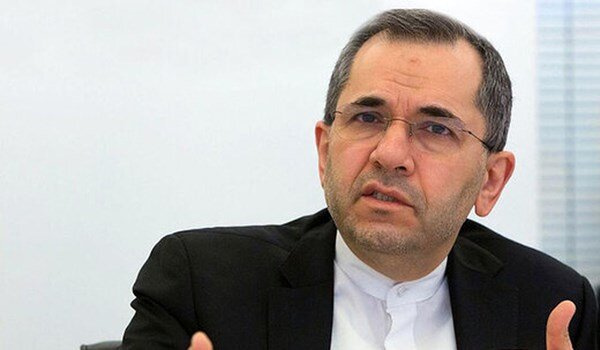Envoy highlights Iran’s ownership of three Persian Gulf islands

“Since the issue related to Iranian islands has been mentioned here, I have to say that Abu Musa, Greater and Lesser Tunbs islands have always been part of Iran. These islands are Iranian and will remain so,” Takht-Ravanchi said, IRNA reported.
He made the remarks at a virtual meeting of the United Nations Security Council on Tuesday.
It came after Secretary General of the Persian Gulf Cooperation Council Nayef Falah Al-Hajraf claimed that the three islands have been “occupied” by Iran and Iran has to stand accountable at an international criminal court for the move.
Over the years, Iran has repeatedly declared its sovereignty over Abu Musa, the Greater Tunb and the Lesser Tunb in the Persian Gulf, and warned the UAE against making claims on the islands.
“The Islamic Republic of Iran does not take permission from anyone to do anything at its borders and territories on the three islands. The three islands of Iran in the Persian Gulf have undoubtedly always belonged to Iran, and these statements do not entitle anyone to any rights and do not affect the exercise of Iranian sovereignty,” Foreign Ministry spokesman Saeed Khatibzadeh said on October 5.
He also condemned Israel for hatching plots against regional countries, saying, “The Zionist regime is in a low and is trying to drown everyone else while it is drowning. I hope that the Emirates and its current government will not be submerged by this regime.”
Opening his Tuesday remarks, Takht-Ravanchi said his “delegation did not intend to ask for the floor again. However, since some baseless allegations have been made against my country this morning which I categorically reject, I have no choice but to respond.”
“The Islamic Republic of Iran has played an incontestable role in ensuring energy security, commercial navigation and stability in the Persian Gulf region and we will continue to contribute to the promotion of peace and security in this sensitive region,” he pointed out.
The envoy also said Iran’s defensive requirements including its missile program stem from geostrategic calculations and a significant historical experience, adding that during Saddam Hussein’s eight-year aggression against Iran that was supported through different means by the U.S. and a number of PGCC countries, Iranian cities were showered by Iraqi missiles and Iranian people were fallen victim to chemical and other lethal weapons provided to Saddam mainly by the West.
“Simultaneously, unjust sanctions and restrictions deprived us of rudimentary means of self-defense. It is our responsibility now to prevent the recurrence of such appalling situation,” he stated.
“It should be borne in mind that security must originate from within and cannot be purchased from outside. Those in our region who spend hundreds of billions of dollars on sophisticated armaments annually should realize that huge military expenditures neither create legitimacy nor long-lasting security,” he added.
The Iranian ambassador warned that huge military expenditures have only turned the region into a powder keg and the only beneficiaries are the exporters of these deadly weapons.
Some PGCC forces are using these sophisticated armaments against the innocent people of Yemen who are experiencing the worst man-made humanitarian catastrophe of contemporary history, a clear case of war crime, he stated.
“There is a long list of internationally wrongful acts attributable to those who make unsubstantiated accusations against Iran,” the envoy said.
Nonetheless, he continued, “We are not here to delve into the past. Our first and foremost priority should be to build mutual trust and respect for sovereignty and territorial integrity of states and no interference in their internal affairs, and promote cooperation on an equal footing in order to create a better and safer region.”
Source: Terhan Times

